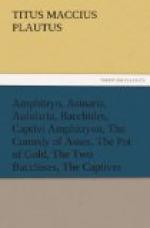Nunc senex est in tostrina, nunc iam cultros attinet. ne id quidem, involucrum inicere, voluit, vestem ut ne inquinet. sed utrum strictimne adtonsurum dicam esse an per pectinem, nescio; verum, si frugist, usque admutilabit probe.
(aside, cheerfully) Now the old fellow is in the barber’s chair, yes, now we have the clippers on him. And master not even willing to throw a towel over him to keep his clothes clean! Is it going to be a close crop, I wonder, or just a trim?—that’s the question. If he knows his business, though, he’ll dock him handsomely.
Hegio
Quid tu? servosne esse an liber mavelis, memora mihi. 270
See here, would
you prefer to be a slave or a free man, tell
me that?
Philocr.
Proxumum quod sit bono quodque a malo
longissume,
id volo; quamquam non multum fuit molesta
servitus,
nec mihi secus erat quam si essem familiaris
filius.
The maximum of pleasure and the minimum of pain, that’s my preference, sir; but being a slave hasn’t bothered me much, though: I wasn’t treated any differently than if I’d been a son of the house.
Tynd.
Eugepae, Thalem talento non emam Milesium,
nam ad sapientiam huius[8] nimius nugator
fuit.
ut facete orationem ad servitutem contulit.
(aside) Well done my boy! I wouldn’t buy Milesian Thales at a thousand thalers: why, he was nothing but the veriest amateur of a wise man compared with master here. How cleverly he’s dropped into the servant jargon!
Hegio.
Quo de genere natust illic Philocrates?
Who are Philocrates’ people there in Elis?
Philocr.
Polyplusio:
quod genus illi est unum pollens atque
honoratissumum.
The Goldfields,
sir,—the most influential and respected
family in those
parts easily.
Hegio
Quid ipsus hic? quo honore est illic?
And the young man himself? How does he stand?
Philocr.
Summo, atque ab summis viris.[9] 279
Very high indeed, sir,—belongs to the highest circles.
Hegio
Quid divitiae, suntne opimae?
How about his property? Pretty fat one, eh?
Philocr.
Unde excoquat sebum senex. (281)
Fat? Old Goldfields could get dripping out of it.
Hegio
Quid pater, vivitne?
What about his father? Is he living?
Philocr.
Vivom, cum inde abimus, liquimus;
nunc vivatne necne, id Orcum scire oportet
scilicet.
He was when we
left home, whether he’s alive now or not, of
course you had
better inquire below as to that, sir.




